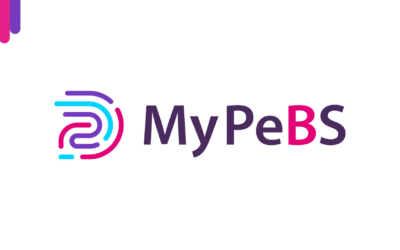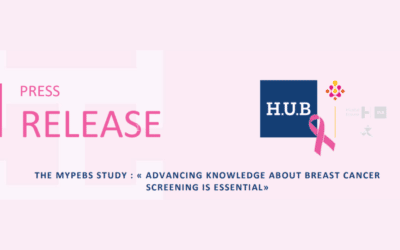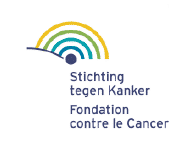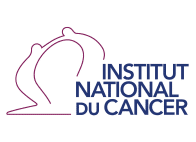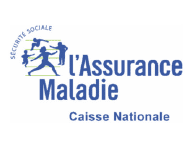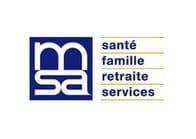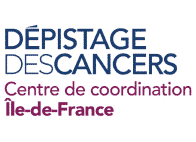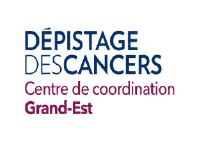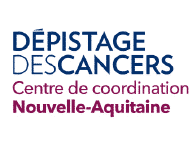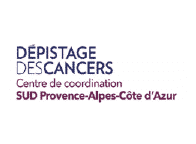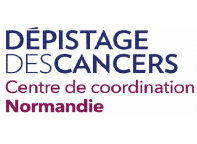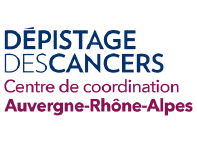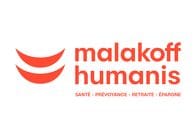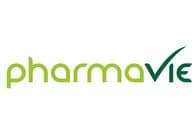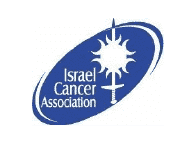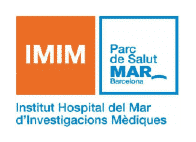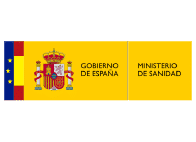What is MyPeBS ?
MyPeBS (My Personal Breast Screening) is a major and ambitious project funded by the European Union. The aim of this unique international clinical trial is to compare a personalised risk-based screening strategy (based on each woman’s individual risk of developing breast cancer in the coming years) with the current standard screening in volunteer women aged between 40 and 70 recruited in 6 countries: Belgium, Spain, France, Israel, Italy and the UK.
The study enrolled 53,143 female participants between June 2019 and July 2023.
MyPeBS (My Personal Breast Screening) is a major ambitious European initiative. This unique international clinical study compares a personalised risk-based screening strategy (based on the individual women’s risk of developing breast cancer) to standard screening among 85,000 women aged 40 to 70 in 6 countries: Belgium, France, Israel, Italy, United Kingdom and Spain.
Animation video presenting the MyPeBS study
News
Eleven clinical trials that will shape medicine in 2025
Jan 9, 2025
Nature Medicine asks leading researchers to name their top clinical trial for 2025, from genetherapies for prion disease and sickle-cell disease to digital tools for cancer and mental health. 2024’s big winners were the pharmaceutical companies behind the blockbuster...
Thank you for participating and contributing to the success of the MyPeBS study!
May 7, 2024
Press release – The My PeBS Study / Belgium : “Advancing knowledge about breast cancer screening is essential”
Oct 26, 2022
October 20, 2022 – MyPeBS (My Personal Breast Cancer Screening) is a clinical study which aims to evaluate a breast cancer screening strategy based on individual risk. The clinical study, coordinated by Unicancer (France) involves 28 partners in 6 countries (Belgium,...
Partners



Intuitim
INTUITIM is a Belgian SME created in 2012 by two former students from different faculties of Catholic University of Louvain (Ecole Polytechnique de Louvain and Louvain School of Management). Since then, INTUITIM provides its clients (hospitals, clinics, private practices…) with innovative solutions to manage both medical imaging as associated data. It also provides customized products and services related to healthcare ICT to universities, companies and other organizations.
Intuitim is active in Belgium, Luxembourg and France.

Vincent NICOLAS, Software Engineer
Vincent NICOLAS is a member of the Telecommunication and Remote Sensing Laboratory of the Catholic University of Louvain for 11 years. Initially responsible for the implementation of the research tools, he took part in several computer management tasks of the laboratory, and later became the manager of several research projects and participated in the management of new researchers in the field of medical imaging. In late 2012 he founded the company Intuitim, spin-off of the Catholic University of Louvain, and took the function of C.E.O.
Role in MyPeBS
Intuitim will take part in the management of the project by helping UNICANCER to manage a part of the IT administration (WP1).
As required by the french regulator CNIL, the MyPebs webplatfrom need to work with a Trusted Third Party to undertake the hosting of the matching database tables. Indeed, for data security reasons, the clinical (anonymized) data are separated from the personal (identifying) data of the trial participants (as well as the genotyping data). The matching of the different set of data for each participant is enabled via dedicated separate table: the matching table.
INTUITIM will take part in this task by providing:
- a secured hosting service (on servers in a French datacenter)
- interconnection with the others IT partners involved in the treatment of participants’ data
- management, maintenance and support of the database as well as the service
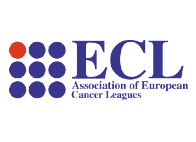


Association Of European Cancer Leagues – ECL
ECL is a pan-European umbrella organisation of national and regional cancer leagues. Established in 1980, ECL has been providing a unique and important platform for cancer societies in the extended Europe, from Iceland to Turkey.
ECL’s 26-member leagues provide advice, support, and other services in cancer control in 23 countries (as of 2016), to a total of 489 million European citizens.
The major fields of activity for ECL’s members include: cancer prevention; public information and awareness
campaigns; services for patients and their families and relatives; and direct support for research to defeat cancer.
David Ritchie
David is currently the senior cancer control officer for the Association of European Cancer Leagues (ECL). His focus at ECL is on ¬both primary and secondary prevention of cancer, with an emphasis on public communication of cancer prevention. He is responsible for the promotion of the 4th edition of the European Code Against Cancer via collaborative working amongst the national and regional cancer leagues.
David is a member of the working group of the European Quality Assurance Scheme for breast cancer centers, which is coordinated by Joint Research Centre of the European Commission as part of the European Commission Initiative on Breast Cancer. David is also a doctoral student at the University of Antwerp where the focus of his research is on evaluating informed decision-making for breast cancer screening participation in Europe.
Role in MyPeBS
ECL will be mostly active the work packages on communication and psychological and social assessments for the participants in the trial.
ECL will focus on the communication requirements for engaging with the general population
To inform them of the project, its progress, and findings will provide technical and administrative resources to patient organisations within this work package.
ECL will engage its membership to be active at relevant points in the project, particularly in those countries of the investigative trial.
actions.
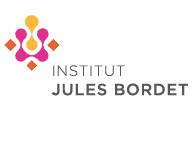


Institut Jules Bordet
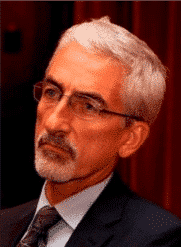
Jean-Benoît Burrion, M.D
Jean-Benoît Burrion, M.D., is actively involved in both fields of a Cancer Center’s quality policy and cancer prevention/early detection. He holds the position of Deputy Medical Director and heads the Prevention and Screening Clinic at the Institute Jules Bordet. He earned his medical degrees at ULB (Brussels). He has a degree in tropical medicine (Institute of Tropical Medicine, Antwerp), in occupational health and industrial toxicology (UCL, Brussels), and in hospital management (ULB, Brussels).
He worked for 20 years as a medical doctor / a program manager on crisis conditions and health development issues in low income countries, before definitively turning to cancer care and prevention.
Having developed the quality policy and set up the Quality Unit in the Institute, he is now involved in the OECI (Organisation of European Cancer Institutes) accreditation program, which is an ISQuA (International Society for Quality in Health Care) certified European instrument aiming to promote quality in cancer care and research across the EU.
He is currently developing several cancer prevention projects and activities, both through the Institut Jules Bordet Prevention and Screening Clinic, and through the public Brussels Coordination Center for Cancer Screening. The Projects encompass development of risk stratification based approach of population screening, multi partnership pilot screening programs, environmental health issues … He is also a lecturer in cancer epidemiology at the nursing school HELB.
Role in MyPeBS
The IJB is a co-lead investigator of the clinical trial and will lead on activities linked to inclusion and follow-up for the clinical trial in Belgium.
IJB will be involved work packages, notably the task-group dedicated to tomosynthesis, and will provide advice and support throughout the project, notably in the area of communication.



Eonix
The company was founded in 2007 and is composed of thirty-five full-time ETP staff. Autonomous, profitable and financially independent, the company is driven by its initial founders.
The Company has developed central platforms for breast cancer screening in the area of Brussels and in Luxembourg. The platforms are used for the whole workflow, going from the invitation for the women in the database to the final protocols after second and third readings, with all the intermediate tests and integrations. Furthermore, the system is integrated with different official instances.
The company also works on the sharing of data for clinical studies and registries related to various pathologies. These platforms are used by hundreds of institutions in Europe which register data for hundred thousand of patients.
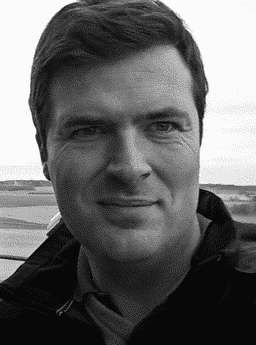
Aloys du Bois d’Aische, Engineer, PhD
Aloys du Bois d’Aische received the Degree in Electrical Engineering from the Universitecatholique de Louvain (UCL) in June 2002. He did his PhD on brain neck and brain images registration until 2005.
After two years spent in a biomolecular laboratory, he created Eonix with Bruno Juste and professors Benoit Macq and Jean-Luc Gala in 2007.
He is also administrator for different companies and charities and worked as scientific advisor for several European and national projects;
Role in MyPeBS
Eonix will be in charge of the development, maintenance, interfacing and quality controls of the trial’s dedicated web platform (WP1).
This will comprise:
- Organization of data collection and retrieval from the IT point of view
- Collaboration with the different Country PIs and WP leaders for the development of tools and functionalities needed for the conduct of the trial
- interfacing and quality controls with the external modules (e.g. risk estimation, electronic consent)
- Development and surveillance of modalities to guarantee data protection over the whole conduct of the project
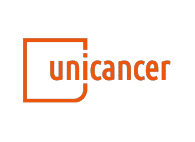


Unicancer
Unicancer is the only hospital network 100% devoted to fighting cancer:
- 18 French Comprehensive Cancer Centres (FCCCs): private non-profit hospitals
- +20,000 women and men engaged in an ongoing quest for excellence in care, research, education
- + 516 000 patients a year
Unicancer in numbers: In France, the FCCCs treat: 30% of the women with breast cancer, 21% of the patients with endocrine cancer and 20% of women with gynaecologic cancers.
A key player in research in France, Unicancer is the main European academic sponsor in oncology: 5000 patients included in R&D sponsored-clinical trials ; 86 ongoing clinical trials, including 44 in recruitment phase; 216 investigational sites involved (public hospitals, private clinics, comprehensive cancer centres), including 52 located in 8 other countries.
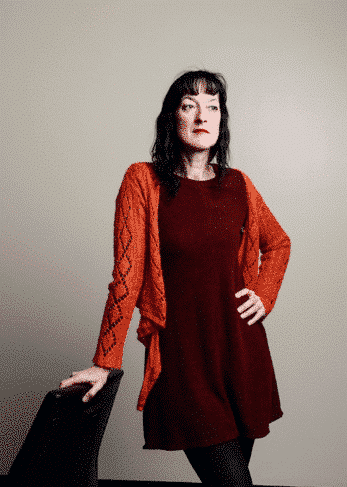
MyPeBS Coordinator
Suzette Delaloge, MD, MSc, Associate Professor of Medical Oncology
Head, Breast Cancer Department, Gustave Roussy, Paris, France
Chairwoman, French UniCancer Breast interGroup UCBG
Suzette Delaloge became a specialist in medical oncology in 1997, and also obtained Master degrees in molecular biology and genetics. She spent a year in Ottawa, Canada, as a research fellow in Pr McBurney’s molecular biology lab in 1993. Dr Delaloge joined the breast cancer team at Gustave Roussy in 1999.
Dr. Delaloge has been Head of the Breast Cancer Department at Gustave Roussy, Paris, France since 2004 and currently leads a multidisciplinary team of 70 doctors, caregivers and researchers, coordinating and managing all clinical and clinical research activities.
Dr. Delaloge’s major areas of expertise and development are precision risk-based cancer prevention, therapeutic development guided by prognostic and predictive biology, and the organization of care in breast oncology. She has been investigator, principal investigator, national or international coordinator of more than 120 clinical trials over the last 20 years.
Dr. Delaloge is the author of more than 210 international peer-reviewed publications and more than 500 presentations at international conferences (Google Scholar H-Index: 53). She is chairwoman of the National French Cooperative Breast Cancer Intergroup –Unicancer (UCBG). She is a board member of the European Society of Medical Oncology (ESMO) and of the French Society of Breast Care and Breast Pathology, and a member of the American Society of Clinical Oncology (ASCO).
Dr. Delaloge is breast specialty editor for European Journal of Cancer and genetics editor for The Breast, and is also a regular reviewer of major international journals in oncology and research. She is a member of several national and international academic commissions, steering committees and scientific boards. Dr. Delaloge is finally committed to continuous teaching activities dedicated to doctors in training and medical students.
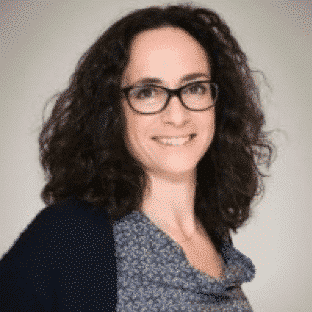
MyPeBS Global Project Manager
Camille Baron
Camille Baron, PharmD, has 20 years of experience in the field of health, mainly in the biotechnology domain. Her areas of expertise are clinical research and scientific & medical communication, which she acquired by working both with academic institutions and pharmaceutical companies (Ariad Pharmaceuticals (Cambridge, USA), Pasteur Institute, LFB Biotechnologies, Sanofi-Genzyme, Unicancer). She has developed knowledge in immunology / infectious diseases, oncology, heamostasis, rheumatology and rare metabolic diseases, as well as in project management skills.

MyPeBS Clinical Trial Manager
Cécile Vissac-Sabatier
Cécile Vissac-Sabatier, PhD, is a Clinical Project Manager at UNICANCER. She has a PhD in Biology. She has over 10 years of experience in the management of clinical study first as clinical research associate and after as clinical project manager. She has worked in the public and in the private sectors on various indications in oncology (breast cancer, multiple myeloma) and non-oncology (Crohn disease, Rheumatoid Arthritis, Interstitial cystitis). She has joined UNICANCER in 2015 and she has been in charge of many clinical studies in breast cancer at national as well as international level.
Role
Unicancer is the lead partner and coordinator of the project.
As coordinator, Unicancer will ensure the scientific integrity of the project and efficient management of the overall project.
Unicancer is also the sponsor of the clinical trial in all countries involved, thus will oversee the regulatory and day-to-day management of the clinical trial internationally.
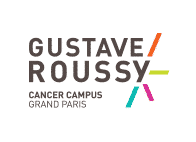


Gustave Roussy
Gustave Roussy is the largest European Cancer Centre. It is a centre for patient care, research and teaching, and patients with all types of cancer can be treated there.
The Institute was founded as a result of the motivation of Professor Gustave Roussy, the father of the concepts of “cross-boundary working” and “multi-disciplinary patient management.”
For 70 years it has been developing an approach to oncology which remains faithful to its founder’s values: innovation, dynamism, cooperation and benevolence.
All of this is built on the three guiding principles: patient care, research and teaching.
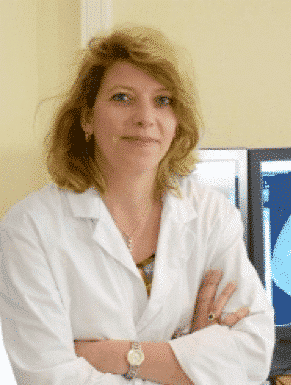
Principal Investigator for France
Corinne Balleyguier, MD
Dr Corinne Balleyguier, MD, PhD, is head of the radiology department at Gustave Roussy Cancer Campus, Villejuif, France. Dr Balleyguier is specialized in Women Imaging, Breast and gynaecologic Imaging. She is chair of Radiology department in Gustave Roussy. Her field of expertise and research is innovation in breast imaging, with development of new imaging techniques to improve breast cancer screening, diagnosis and treatment (contrast spectral mammography, tomosynthesis, elastography under ultrasound and MRI, laser treatment of breast tumors etc.). She is a member of the French radiological society (SFR), vice-president of the French breast Imaging society (SIFEM), the European Society of Radiology (ESR), and the European Society of Breast Imaging (EUSOBI). She is an active member elected since 2012, of the European Society of Uro-genital Radiology (ESUR), the Radiological Society of North American Radiology. She is part of the ESUR gynaecological subcommittee since 2008. She has been section editor on Woman Imaging for European Journal of Radiology since 2010. Dr Balleyguier is involved in breast Imaging committee for ECR 2012-2013-2014-2015. She was the Chairwoman of Uro-Gynecological Imaging of ECR 2010 and of breast imaging committee for ECR 2016.
Role in MyPeBS
Gustave Roussy will act as the Principal Investigator (PI) for the clinical trial in France and will coordinate, in collaboration
with the project lead, the research investigators in France.
Gustave Roussy will also perform the full statistical analysis of the clinical trial results and ensure the quality control of the data.
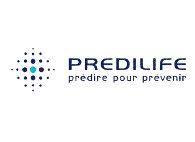


Predilife
Their first product was Mammorisk, an innovative software tool that can be used to estimate the risk of developing breast cancer.
MammoRisk was developed as a project funded by the ARC Foundation (France), in collaboration with the Gustave Roussy Cancer Centre (France) and the Breast Cancer Screening Consortium (US).
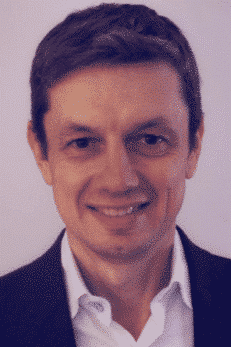
Stephane Ragusa
Stephane Ragusa is the founder and President of Predilife. He has been working on risk prediction models and software for prevention since 2004. He has led the project Predicancer granted by the National Agency of Research.
He graduated from Ecole Polytechnique, and from National School of Statistics and Economics (ENSAE). He holds a PhD in Molecular Biology from University Paris XI – Orsay. He is assistant professor of Statistics at University Paris VI Pierre et Marie Curie.
Role in MyPeBS
Predilife will be responsible for the implementation of the density and risk assessment software to be used in the experimental arm of the trial.
It will be connected with the global website of the clinical trial to retrieve the data field in by the investigators and the participants, as well as the genotyping



Collège National Des Generalistes Enseignants – CNGE
It brings together all the academics of the discipline (80 university, 200 associates and 8000 GP trainers) and constitutes the academic “pole” of the recognised discipline in France.
Marie-Eve Rougé Bugat, MD-PhD,
Université Paul Sabatier Toulouse III, Primary Care department, Toulouse, France
UMR 1027 (INSERM-UPS), allées Jules Guesdes, Toulouse, France
General practitioner
DESC oncology
Research CNGE member – Expert in field of cancer in primary care – Investigator of the CNGE network
Role in MyPeBS
NGE will mobilise of the French CNGE Network investigators (1 coordinator per area, with 15 expected participating French areas and 25 GPs investigators per areas) during the investigation trail of the project.
CNGE will be highly engaged in the communication work package, especially towards the healthcare community and the investigators.
CNGE will set-up a training e-learning seminar for Health professionals (development,
organisation and implementation)



USPN
It now has 24,000 students, spread across five campuses pursuing degrees or continuing education. Truly multi-disciplinary in nature, Paris University 13 is a major centre of teaching and research in the north of Paris.
Within Université Paris 13, The Institute for Interdisciplinary Research on Social Issues (Social Sciences, Policy and Health) (IRIS) is a mixed research unit associating EHESS, CNRS, Inserm, and the University of Paris 13.
IRIS brings together some 100 research holders in anthropology, sociology, history, law, political science, public health and forensic medicine.

Sandrine de Montgolfier
Sandrine de Montgolfier has been involved in many research projects in the field of empirical ethic link to health professional practices (de Montgolfier & al; Derbez & al; d’Audiffret & de Montgolfier). She also developed an expertise in the field of ethical questions raised by cancer screening (Gred and French citizen and professional consultation). She coordinated several multidisciplinary projects linked to genetic screening (INCA, ABM)
Role in MyPeBS
Université Paris 13 is the leader of the Work Package 5: Sociological, ethical and psychological assessments. They also lead on the specific task on analysing the professionals’ point of view concerning this new screening strategy. Université Paris 13 will contribute to the work packages on communication and developing recommendations for breast screening based on the outcomes of the project.
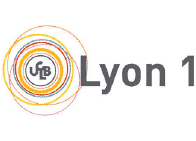


Universite Lyon 1 Claude Bernard – UoL1
Claude Bernard Lyon 1 is part of Université de Lyon, the most important French University site outside the Paris region.
Within UoL1, the research lab Health Services and Performance Research (HeSPeR) is focused on health services performance in medical care, health promotion and prevention.
Nora Moumjid
Nora Moumjid is Senior Lecturer in Health economics and Public Health applied in cancer in Lyon 1 University, Faculty of Pharmacy. Since 1997, she works in the Comprehensive Cancer Center Léon Bérard where she leads a multidisciplinary working group composed of clinicians, socials scientists and patients on shared decision-making. She is member of the shared decision-making scientific community since the beginning and she will chair the international shared decision-making that will take place in Lyon in July 2017. She published several papers in international and national peer-reviewed journals on patients’ information and participation to the decision-making process with a focus on elicitation and risk communication methods.
Role in MyPeBS
UoL1 will lead the analysis of women understanding of the information provided and of the socio-economic status and its impact on women’s decisions towards breast cancer screenings (organised, individual and risk-stratified).
UoL1 will be involved in measures of perception of individual disease risk, risk/benefit of the prevention options, and effects on cancer-related
behaviours and other psycho-social aspects of the trial.
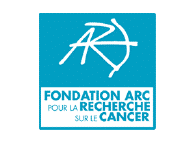


Fondation Arc Pour La Recherche Sur Le Cancer Fondation – ARC
Since its creation as an association in 1962, the ARC (French acronym for: Cancer Research Association) has been a forerunner in the operation and financing of oncology research.
In 2012, in order to meet the new research challenges, the ARC decided to become a foundation, namely the ARC Foundation for Cancer Research.
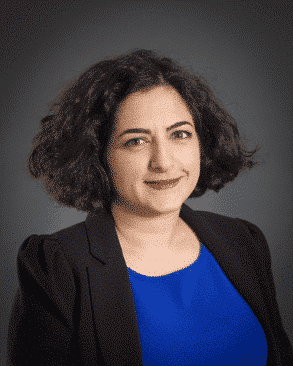
Nancy Abou-Zeid, PhD.
Nancy Abou-Zeid has a PhD in Cell biology, and a training in clinical research. She has 15 years of experience in the field of oncology, both in basic and clinical research. She is Head of Translational research and innovation at the French Fondation ARC pour la recherche sur le cancer since 2011, managing a team of 3 collaborators. Her main activity is the identification of innovative projects in the field of cancer (basic, translational and clinical research, public health, epidemiology), through calls for proposals or direct partnerships with research institutes/clinical research sponsors in France or abroad. Nancy is also in charge of ARC Foundation’s scientific collaborations with French and international partners in the field of cancer research.
Role in MyPeBS
The Fondation ARC will rely on its expertise to contribute to the communication (WP6) about prevention, screening and research, in order to support the other partners in the definition of messages and the best tools needed for dissemination of the different categories of messages.
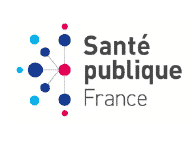


Agence Nationale De Sante Publique – SPFrance
Santé publique France (SpFrance) is the French national public health agency (around 600 staff members). Its mission is to serve the population in all aspects of public health based on scientific knowledge, data, and information. It comprises
seven scientific directorates and 15 regional units throughout the national territory. The Directorate for noncommunicable
diseases and trauma (~30 scientific staff members) covers the areas of cancers, cardiovascular diseases, mental health, nutrition, diabetes, neurodegenerative diseases, and unintentional injuries.
The cancer group comprises 10 scientific members including epidemiologists, biostatisticians, medical doctors, and data managers. Its activities include the surveillance of cancers which entails the coordination of
several data sources such as cancer registries, death certificates, health administrative databases; and the evaluation of the national cancer screening programmes.
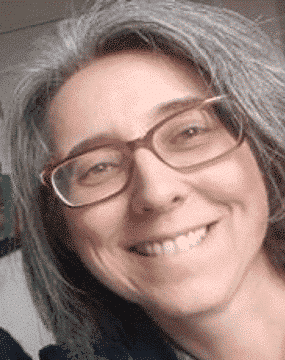
Agnès Rogel, PhD
Agnès Rogel holds a PhD in biostatistics. She held several positions before working at Santé publique France :
She has been employed at the French University as a lecturer, at Electricite de France and at the Institute of Radiation Protection and Nuclear Safety as a biostatistician. She conducted several large epidemiological studies, mainly
cohort studies in cancer epidemiology and radiation, with main focus on breast, lung and thyroid cancer. She joined the cancer team of the French public health institute (Santé publique France) in 2008, where she first worked on cancer surveillance studies using registry or health insurance data, mainly on breast, thyroid, lung and uterine cancers. While maintaining activities and expertise on cancer surveillance, cancers attributable to lifestyles and the environment, including radiation, in 2013 she became responsible for the evaluation of breast cancer screening. Its main activities are then : the constitution of the national French breast cancer screening database, collapsing data from 99 departments; the production and analysis of the performance indicators of the national screening program; the statistical analysis of their temporal and geographical variations; the statistical analysis of the relationship between screening and social deprivation; the impact of the French breast cancer screening program on mortality.
Role in MyPeBS
SpFrance will advise on the harmonisation of data collection in participating local screening structures in France and will assess whether the trial control group is comparable to the population participating in the regular French breast cancer screening programme with regards to screening results.
SpFrance will also contribute to the calibration and validation of the microsimulation model for France to estimate long-term benefits, harms, and cost-effectiveness; and contribute to the communication, results’ dissemination and recommendations by interacting with French health
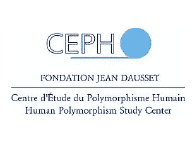


CEPH-Fondation Jean Dausset
Today CEPH is engaged in a variety of programs dealing with human translational genomics. CEPH is the coordinator of the GENMED LabEx funded by the French National program “Investissement d’Avenir”.
The CEPH Biobank is a center for biological resources (CRB) with a longstanding (more than 30 years) recognized experience. Historically, the CEPH Biobank was involved in the first French collections of biological samples established for genetic studies of diabetes, aging, Crohn’s disease, spondylarthropathy, neurofibromatosis but also in population genetics studies with the Human Genome Diversity Panel-CEPH (HGDP-CEPH). As of today, CEPH biobank is a key partner in the establishment of numerous cohorts funded by the French national program “Investissements d’Avenir” such as COBLAnCE, CANTO, RaDiCo and other national cohorts such as GAZEL, EPIPAGE2.

Jean-François Deleuze, Ph.D
Jean-François Deleuze is, since October 2012, both the director of the Centre National de Recherche en Génomique Humaine (CNRGH) and the scientific director of the Centre d’Etudes du Polymorphisme Humain (CEPH-Fondation Jean Dausset). JF Deleuze began his career in the pharmaceutical industry working for Rhône Poulenc Rorer and then Aventis and finally Sanofi where he established and headed the worldwide Human Genetics center of the company (40 peoples) for about 10 years. JF Deleuze has coordinated numerous international translational research collaborative projects (identification of biomarkers and therapeutic targets) in the field of the genetics of multifactorial diseases (schizophrenia, bipolar disorder, Alzheimer …) and cancer, involving academic groups but also biotechnology companies. JF Deleuze was one of the initiators/pioneers of the introduction of personalized medicine approaches in the pharmaceutical industry. In his last 2 years at Sanofi, JF Deleuze built an efficient and state of the art stem cell platform that has delivered world-class translational tools and disease models. Beside his actual leadership positions at CNRGH and CEPH, JF Deleuze is executive board member of France Génomique and heads the laboratory of Excellence (Labex) GenMed dedicated to the development of personalized genomic medicine. Recently, JF Deleuze played a key role in the development of the French Genomic medicine 2025 plan. He is in charge of heading the R&D center of the French genomic Medicine plan (CREFIX). JFD is member of several scientific boards (University Paris Sud, Vacarme project, IBISA…) and member of the editorial board of Human genetics. JFD has authored 160 publications in peer review journals and 20 patents in the field of genomic medicine. JFD’s H factor is 33.
Role in MyPeBS
CEPH will be in charge of DNA extractions, Quality Control, aliquoting and transfer of DNA aliquots to CEA (WP3).
CEPH will also participate to the dataflow with the web platform (WP1) and advise the sponsor and investigator centres regarding samples flow (WP1 and 2).
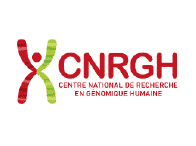


CNRGH/CEA
The CNRGH has developed a number of state-of-the-art genomics technology platforms and laboratories for the management of biological resources, for discovery of disease genes and biomarkers, and for follow-up studies using various approaches including functional genomics. A team of bioinformaticians and bioanalysts ensure data quality control, management and interpretation respectively. Key platforms include high-throughput platforms for genotyping, sequencing (WGS, WES, genes panel etc.), expression profiling (RNA-seq), DNA methylation analysis and a number of functional genomic applications (e.g. oxWG-BS, WG-BS, HiC, DNase-seq, ATAC-seq, ChIP-seq etc.). In addition there is a laboratory dedicated to technological development that performs extensive testing on the latest omics based technologies to evaluate them and determine if they are ready for routine production. The CNRGH has been extensively testing the latest long-read technologies including the Chromium platform (10X Genomics), the MinION and PromethION (Oxford Nanopore Technologies) and the Saphyr optical mapping platform (Bionano genomics).

Jean-François Deleuze, Ph.D
Jean-François Deleuze is, since October 2012, both the director of the Centre National de Recherche en Génomique Humaine (CNRGH) and the scientific director of the Centre d’Etudes du Polymorphisme Humain (CEPH-Fondation Jean Dausset). JF Deleuze began his career in the pharmaceutical industry working for Rhône Poulenc Rorer and then Aventis and finally Sanofi where he established and headed the worldwide Human Genetics center of the company (40 peoples) for about 10 years. JF Deleuze has coordinated numerous international translational research collaborative projects (identification of biomarkers and therapeutic targets) in the field of the genetics of multifactorial diseases (schizophrenia, bipolar disorder, Alzheimer …) and cancer, involving academic groups but also biotechnology companies. JF Deleuze was one of the initiators/pioneers of the introduction of personalized medicine approaches in the pharmaceutical industry. In his last 2 years at Sanofi, JF Deleuze built an efficient and state of the art stem cell platform that has delivered world-class translational tools and disease models. Beside his actual leadership positions at CNRGH and CEPH, JF Deleuze is executive board member of France Génomique and heads the laboratory of Excellence (Labex) GenMed dedicated to the development of personalized genomic medicine. Recently, JF Deleuze played a key role in the development of the French Genomic medicine 2025 plan. He is in charge of heading the R&D center of the French genomic Medicine plan (CREFIX). JFD is member of several scientific boards (University Paris Sud, Vacarme project, IBISA…) and member of the editorial board of Human genetics. JFD has authored 160 publications in peer review journals and 20 patents in the field of genomic medicine. JFD’s H factor is 33.
Role in MyPeBS
The CEA will be in charge of all the genotyping of the project as well as of genotyping data quality control and transfer to the centralized data handling platform (WP3).
The CEA is running an Illumina high throughput genotyping platform and has the capacity to treat 12 96-well plates per week.
The CEA will also be involved in the discussions concerning the list of SNPs to add on the genotyping array.



Assuta Medical Centers Ltd
Assuta Imaging Centres offer a broad range of services and tests nationwide.
Assuta is one of the founders of breast screening imaging centres, providing this service to the Israeli population for the last 20 years.

Michal Guindy, M.D. MPA
Michal Guindy received her MD from Ben-Gurion University Medical School, Beer Sheva, Israel in 1982. Dr Guindy specialized in radiology and is still a practicing radiologist (breast). In 2001 she earned a MPA from the Kennedy School of Government – Harvard University, Boston, Massachusetts USA. At Maccabi Healthcare Services (HMO) Dr Guindy held several management positions during the years 1998-2014. She chaired the Risk Management and Patient Safety Department from 2003 through 2009. From 2009 through 2011 Dr Guindy was Head of Central Services, where she was responsible for radiology telemedicine, laboratories including the pathology lab, pharmacies and call centers. During the years 2011- 2014 Dr Guindy served as Medical Director of the Central district, Israel, a position responsible for medical services provided to 250,000 people.Since 2014 Dr Guindy has been Medical Director of Imaging at Assuta Medical Centers. She is responsible for running the seven imaging centers across Israel producing over 600,000 studies annually.
Her academic activities include coordinator of Patient Safety Implementation Program (WHO initiative) in Sackler School of Medicine, Tel Aviv University. Since 2013 Dr. Guindy has been involved in multiple Big Data research projects, particularly in the field of radiology.
Role in MyPeBS
ASSUTA will provide the PI of MyPEBS clinical trial for Israel and the leader of the genetic analysis platform in Israel.
Regarding Work Package 5 and Work Package 6, Israeli social and communication specialists will be invited to exchange with the active partners of the specific to consider language and cultural differences.
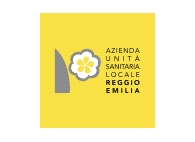


Azienda Unita Sanitaria Locale Di Reggio Emilia
Reggio Emilia province. It provides directly in-patients, out-patients, primary and preventive care; it also buys from other private and public hospitals and clinics for all the citizens residents in the province.
It works for the protection and the improvement of public health, health promotion and the reduction of health inequalities and access to services.
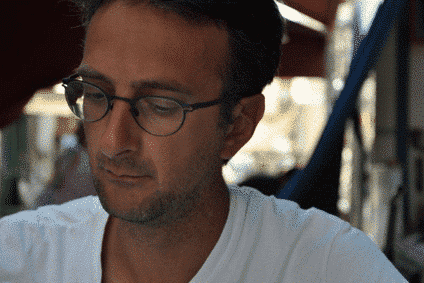
Paolo Giorgi Rossi, PhD, MSc
Dr Paolo Giorgi Rossi obtained the MSc in Molecular Biology in 1994 and Ph.D. in Cellular and Animal Biology in 1998 at the University of Pavia (Pavia, Italy). Since 1998, he has been working at the Agency for Public Health of Lazio, Rome, Italy, where he directed the Health Technology Assessment Service from 2006 to 2012. Now he is the director of the Epidemiology Service in the Reggio Emilia Local Health Authority and Research Hospital (AUSL – IRCCS). His principal interest is the evaluation of Public Health interventions and particularly cancer screening. He is principal investigator of several independent epidemiological studies and screening trials. He is author or co-author of more than 250 publications indexed in PubMed and more than 50 monographs and book chapters. He is has been the president of the Italian Cervical Cancer Screening Group, the scientific society of the cervical cancer screening in Italy and member of the coordinating committee of the Italian Mammographic Screening Group. He collaborates with the EUREGHA (European Regional Health Authorities Association) in the screening working group.
In 2006 he joined the didactic committee of the Ulysses International Master in HTA.
Role in MyPeBS
AUSL RE will co-coordinate the clinical trial investigation in Italy for the whole trial. It will also coordinate the recruitment in the 6 Italian centres with the goal of recruiting at least 30000 women.
AUSL RE also coordinates the imaging working group. This task includes the definition of the operative protocols for breast density measurement, use of mammography, tomosynthesis (including synthetic 2D), ultrasounds and MRI.
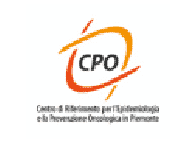


Azienda Ospedaliera Citta Della Salute E Della Scienza Di Torino
della Scienza, Torino, is active in cancer registration, primary cancer prevention, cancer screening programmes, monitoring the quality of care for cancer patients and research on cancer aetiology, within the Regional Health System.
In May 2014 CPO was designated as WHO Collaborative Centre for cancer early detection and screening, representing the only European WHO Collaborative Centre in this field.
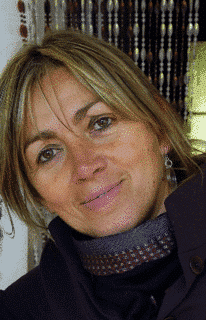
Livia Giordano
Senior epidemiologist at the Unit of Epidemiology, Screening and Cancer Registry – CPO of AOU Città della Salute e della Scienza di Torino.
- 1991-2001: Epidemiologist at Local Health Agency n. 1 – Turin.
- Since 2002: Epidemiologist c/o AOU Città della Salute e della Scienza di Torino.
- 1989- 2000: Member of the Oncology Committee of the Piedmont Region.
- 2000-2010: Member of the Faculty of the post-doctoral School of Oncology, University of Turin 2003-2011: Member of the Anti-Tobacco Board – Piedmont Region
- 2009-2015: President of the Italian Group for mammography screening (GISMa)
- Since 1991: Member of the Faculty of the Italian School of Senology
- Since 1993: Member of the School of Public Health, University of Turin.
- Since 2008: Member of the Editorial Board of the journal ‘Epidemiologia e Prevenzione’
- Since 2012 – Member of the Scientific Committee of Europa Donna
- Since 2015: chapter co-editor on Communication of the European Breast Guidelines promoted by ECIBC
Research fields: Breast and cervical cancer screening organisation and evaluation, randomised trial on cancer screening compliance, communications and psychological aspects in secondary cancer prevention interventions, cancer screening by immigrant and minority women; cancer screening in developing countries and in low-resource settings; smoking prevention and control; cancer screening and healthy lifestyle promotion interventions (diet, physical activity and tobacco consumption).
Role in MyPeBS
CPO-AOU will coordinate Work package 6 -Communication.
CPO–AOU will work to guarantee an efficient and representative recruitment of women within the clinical trial, offering inter-cultural and balanced communication and encouraging an informed participation.
The communication will be directed both to the general public, women in the target age category, advocacy groups, and health professionals.
CPO-AOU will also participate in the investigative trial of MyPeBS by seeking to enrol 5.000 women from the Piemonte region.



Istituto Scientifico Romagnolo Perlo Studio E La Cura Dei Tumori Srl – IRST IRCCS
IRST IRCCS is fully integrated within the Public Health system in a north-eastern area of Italy with more than 10.000.000 of resident population.
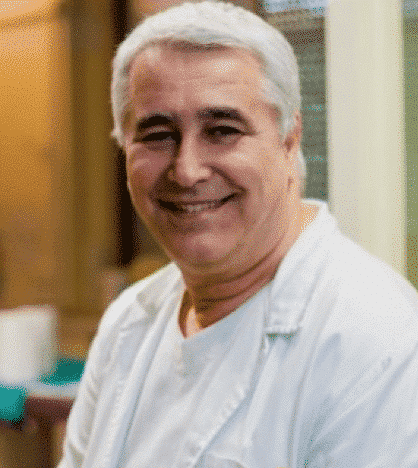
Fabio Falcini, MD
Fabio Falcini graduated in Medicine and Surgery at the Medical School University of Bologna, specialization in Oncology, haematology and radiology. Member of the Ethical Committee of Area Vasta Romagna (2007-2011); Appointed Coordinator of screening programme for prevention of colorectal tumor in the Area Vasta Romagna-Programma regionale Screening from Dec 2004;Director of Oncological Prevention Unit of Forlì (AUSL Romagna);Director of the Romagna Cancer Registry (IRST);Director of Onco-Hematology Department at IRST; Coordinator of 3 screening programs (breast and uterus since March 1995; colorectal cancer in December 2004, at Ospedale di Forlì). Vicesecretary of Associazione Italiana Registri Tumori (AIRTUM) 2009-2013; Member of board for the personnel training (BDF) 2002-2007 in AUSL Forlì;Deputy President Lega Italiana per la Lotta contro i Tumori (LILT) from july 2014;
Coordinator IOR Medical Scientific Committee from June 2014. Coordinator and teacher in courses on clinical and instrumental breast cancer diagnostics organized by the Forlì School of Biomedical Sciences and Oncology 1992-1995; member (1997) of the Ministry of Health working group, Department of Planning, for the translation of ICD-9-CM classification; 1996-2001 coordinator of the National Research Council (CNR) Strategic Project Robotics in Surgery; Teacher at the Postgraduate School of Oncology, University of Ferrara for the topics “Epidemiology, Prevention and Early Diagnosis of malignant tumors”(ongoing).
Role in MyPeBS
IRST IRCCS will seek to 5.000 women in their region as part of the MyPeBS clinical trial.
IRST IRCCS will contribute to methodology and data analysis in Work Package 3 and provide further expertise and knowledge to other work packages in the project.
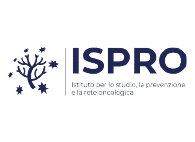


Istituto Per Lo Studio E Laprevenzione Oncologica – ISPRO
primary and secondary preventive oncology research. Within the Institute screening for breast, cervical and colorectal cancer is ongoing since the 1980s and high skilled competences in epidemiology, breast radiology, gynaecology and gastroenterology are represented.
The Institute was appointed for both National Screening Monitoring Centre (ONS) and Regional Reference Centre for Preventive Oncology (CRRPO).
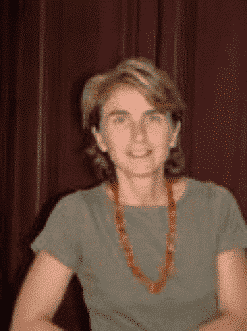
Paola Mantellini, MD
Paola Mantellini is an oncologist, Director of ISPRO Screening Unit and Coordinator of Regional Reference Centre for Preventive Oncology. She is involved in quality evaluation of organized screening programs through indicators monitoring, clinical auditing (site visits), elaboration and update of screening recommendation at a regional level. She is also involved in coordination of the Tailored Breast Screening Trial and she had developed experience in organizational analysis for Activity Based Costing methodology
Role in MyPeBS
ISPRO will seek to include 5.000 women in their region as part of the MyPeBS clinical trial.
ISPRO will contribute to the methodology and data analysis components of Work Package 3, and the mathematical modelling to be performed in Work Package 4 by focusing on the topics including screening overdiagnosis and efficacy, as well as breast cancer risks factors evaluations.
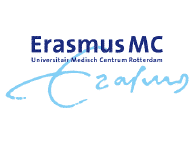


Erasmus MC
Erasmus MC is the largest University Medical Centre of the Netherlands, with around 14,000 staff members.
Its mission is to contribute to a healthy population and to excellence in health care through research and education.
The Department of Public Health has around 150 staff members, and its main goal is to support
evidence-based public health through research and education. Among the public health areas studied by the Department are social determinants of health, medical demography, occupational health, cancer screening, infectious disease control, and medical decision-making.
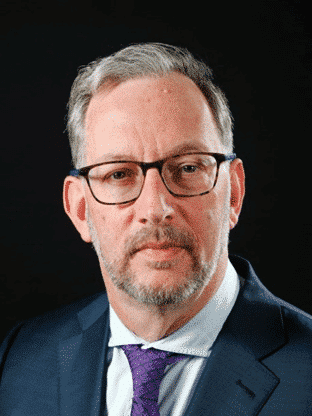
Henricus J de Koning
Professor of Public Health & Screening Evaluation in the Department of Public Health of the Erasmus Medical Center in Rotterdam.
Professor Henricus (Harry) J de Koning worked as Researcher and Assistant Professor in the Department of Public Health of the Erasmus University in Rotterdam (1987-1999). He became Associate Professor in 1999 and in 2008 he was appointed Professor of Public Health & Screening Evaluation in the same department. He was also Senior Associate in the Department of Health Policy and Management at the Johns Hopkins Bloomberg School of Public Health (2011-2012). Since 2011 he has been a Member of the Medical Advisory Board of the Royal Netherlands Academy of Arts and Sciences (KNAW).
His major scientific contributions are in the areas of
- Designing, running and evaluating large-scale multidisciplinary population-based randomized controlled screening trials to establish the efficacy of screening;
- Evaluating active international screening programs and tests to establish effectiveness;
- Guiding public health policies using predictions of favorable and unfavorable effects and the cost of screening, based on micro-simulation modelling of the natural history of disease, and cost-effectiveness and cost-utility analyses.
See also:
http://www.erasmusmc.nl/public-health/organization/our-associate-professors-page/h-de-koning/
Role in MyPeBS
ERASMUS MC leads on the work package responsible for mathematical modelling to quantify the long-term benefits, harms and cost effectiveness of risk-based screening scenarios (Work Package 4).
ERASMUS MC will actively contribute in an advisory capacity to the majority of other work packages in the project.
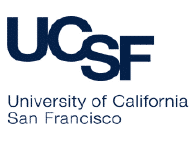


The Regents Of The University Of California
UCSF is the top public recipient of funding from the National Institutes of Health (NIH) in the United States.
The Athena Breast Health Network, headquartered at UCSF, is a network of the 5 University of California medical centres and Sanford Health, one of the largest rural health networks in the country.
Laura Esserman, MD
Dr. Esserman has a wealth of experience overseeing innovative, large-scale clinical trials. She is co-principal investigator of the I-SPY platform trial taking place at institutions across the United States. I-SPY is a biomarker-rich, adaptive, multi-agent clinical trial platform that introduces administrative and statistical efficiencies, and capitalizes on the availability of a near-term surrogate endpoint to speed the phase II development of new agents for neoadjuvant treatment of advanced breast cancer. To date, 10 agents have been screened in the trial, with a number ‘graduating’ to phase III clinical trials.
In 2015, under Dr. Esserman’s direction, Athena Network was awarded a grant from the US “Patient Centered Outcomes Research Institute” to conduct a large-scale comparative effectiveness trial of risk-based screening for breast cancer versus annual screening (the US standard of care). WISDOM has assembled a truly multidisciplinary team and demonstrated its significant expertise in a vast array of specialties required to undertake a trial such as WISDOM or MyPeBS, including: mammography and standardization of imaging, genetic screening and counselling, modelling breast cancer risk and polygenic risk scores, development of clinical decision tools based on cancer risk, electronic survey tools and instruments and their integration with case report forms, measurement of the psychological impacts of screening/diagnoses, and other operational components required for trial implementation. The 100,000 patient WISDOM study, a companion study to the current proposal, opened in September 2016 and is currently enrolling.
Role in MyPeBS
UCSF, through The Athena Network and WISDOM Study are the US-based companion/partner study to MyPEBS.
In general, UCSF will provide advice and expertise, as needed, for all aspects of MyPEBS, sharing our experience in the design, implementation, enrolment and analysis of the WISDOM study of risk-based screening for breast cancer, which is currently enrolling in the US.



University of Cambridge
Its reputation for outstanding academic achievement is known world-wide, reflecting the high-quality original research carried out by its staff and the intellectual achievements of its students.
The university employs more than 10,000 staff, while more than 12,000 undergraduate and over 7,000 postgraduate students live and work in one of the university’s 31 autonomous Colleges.
Within the University of Cambridge, the School of Clinical Medicine, Radiology Department participates in MyPeBS. This department currently works with the Huntingdon & Cambridge Breast Screening programme, which delivers mammography screening to 20,000 women per annum.
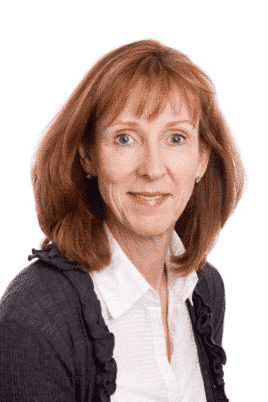
Principal Investigator for UK
Prof Fiona Gilbert
Professor of Radiology, Head of Department of Radiology at the University of Cambridge for 5 years and prior to that at the University of Aberdeen since 1996. She is an expert in all modalities of clinical breast imaging, has more than 30 years experience in breast screening, previously as Clinical Director of screening in the Northeast of Scotland. She has an extensive research track record in assessing novel imaging techniques (Multispectral OptoAcoustic imaging, DBT, CESM, PET MRI), has experience in running multicentre imaging trials, undertaking systematic reviews. She has run several large scale clinical imaging studies in breast screening (TOMMY trial 9,000 women; CADET II 30,000 women; CADET I 10,000 women). She participated in MARIBS MRI screening trial of high risk screening which influenced practice in the UK and the IBIS, the tamoxifen prevention trial. She is chair of the UK National Cancer Research Institute Imaging Advisory Group.
Role in MyPeBS
On behalf of the UK sites, the University of Cambridge will coordinate all the regulatory and ethical submission and follow-up, writing (and
translation) of all documentation, as well as the safety and pharmacovigilance activities and quality assessments working with the patients’ associations and trial coordinators.
The University of Cambridge will also identify and recruit women into the personalised screening programme from those women who are currently attending the UK national breast screening programme end ensure follow



University of Manchester
The University of Manchester is a public research university in Manchester, England, formed in 2004 by the merger of the University of Manchester Institute of Science and Technology and the Victoria University of Manchester.
University of Manchester is the largest University in the UK. It has three Schools in Faculty of Biology, Medicine and Health
and a very strong track record in health-based research.
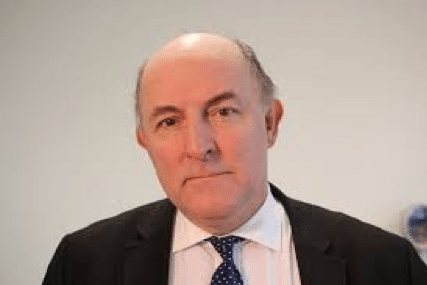
Prof Gareth Evans
Professor Evans has established a national and international reputation in clinical and research aspects of cancer genetics, particularly in neurofibromatosis and breast cancer.
He has published 715 peer reviewed research publications; 265 as first or senior author. He has published over 110 reviews and chapters and has had a book published by Oxford University Press on familial cancer. He has an ISI web of knowledge H-index of 97 and google scholar of 131 having only published his first article in 1990. In the last 7 years he has raised over £45 million in grants for multicentre and local studies – approximately £38 million to Manchester. He is Chief Investigator on two NIHR program grants (2009-2014-£1.59 million) (2017-2020-£1million) on breast cancer risk prediction and also has an NIHR RfPB grant as CI (2011). He as supervised 13 successful doctoral theses and is currently supervising five. He has led a successful bid for a Nationally funded NF2 service (£7.5 million pa) that started in 2010 and is involved in the national complex NF1 service. He is overall cancer lead (3 themes) and Cancer Prevention Early detection theme lead on the successful all Manchester NIHR Biomedical research centre bid (2017-2022-£28.5million). He is lead clinician on the NICE familial breast cancer guideline group and until recently a trustee of Breast Cancer Now and the Neuro Foundation. He is on the editorial board of JNCI and is a board member of the Science Strategy Committee of Breast Cancer Now.
Role in MyPeBS
The University of Manchester will be involved in
enrolling participants into the clinical trial in the UK, and collecting the subsequent data.
The University of Manchester will also provide expertise into the risk stratification process, and will lead on measures of perception of individual disease risk, and
effects on cancer-related behaviours.



University of Nottingham
Yan Chen, BSc PhD HonMRCR
Director of the Applied Vision Research Centre. Dr Chen is a computer scientist and a leading international scientist in the field of medical imaging perception and specialises in women’s health, particularly breast cancer. She leads the PERFORMS self-assessment scheme in breast cancer (a major UK national research project which is funded at over €1.2m every three years), as well as other imaging research in radiology and surgery. She has been awarded honorary membership of the Royal College of Radiologists for her radiological research.
Role in MyPeBS
Within MyPeBS’s Workpackage 3, the UoN will lead in the quality assessment of the trial radiologists to ensure that they all are of an equivalent international standard. The UoN will deploy the PERFORMS self-assessment scheme across all radiologists and regularly assess their breast cancer identification skills using difficult test breast screening case sets of known outcome. The UoN has numerous appropriate test sets of challenging and difficult screening cases which it can use and which are based on many years of experience with the UK Breast Screening Programme
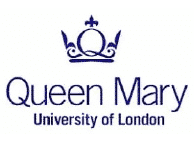


Queen Mary University of London
It encompasses Barts and the London School of Medicine and Dentistry.
The Centre for Cancer Prevention (CCP) is housed in the Wolfson Institute of Preventive Medicine within the School of Medicine and Dentistry.
The CCP is a leading research centre in primary prevention of and screening for cancer.
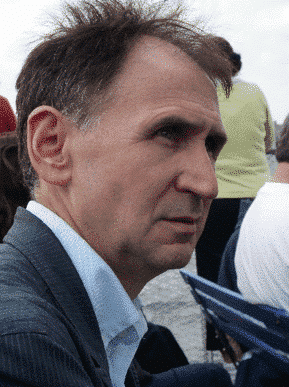
Stephen W. Duffy
Stephen Duffy is a statistician by training, educated at the University of Edinburgh and Imperial College, London. He has worked in the UK, Singapore, France, Sweden and Russia. He is the Director of the Department of Health’s Policy Research Unit in Cancer Awareness, Screening and Early Diagnosis.
For the last three decades, his research has been mainly in cancer epidemiology, prevention and screening. He worked on the pioneering Swedish Two-County Trial of breast cancer screening, on which the UK’s national breast screening programme was based. Since then, he has taken a major role in a number of other trials of cancer screening, in breast, colorectal and lung cancer. These include the UK Trial of Flexible Sigmoidoscopy whose results changed national policy within weeks of publication, and the FH01 study of annual mammography in young women at enhanced familial risk of breast cancer, which contributed to the NICE guidelines on breast cancer risk management.
More recently his research has focussed on behavioural aspects of screening, including trials of reminders, second timed appointments and out-of-hours appointments in breast cancer screening, and trials of augmented invitations and reminders, and primary care endorsement in colorectal cancer screening. He is a screening editor on the EU Guidelines Development Group for breast cancer screening and diagnosis, and a member of the UK’s National Screening Committee.
Role in MyPeBS
QMUL will pay a major part in drafting the recommendations in the light of the results of the MyPeBS project.
QMUL will also provide support to the statistical analysis and interpretation and will advise the UK centres taking part in



Independent Cancer Patients’ Voice – ICPV
The aim of ICPV is to improve existing treatments for every cancer patient and develop new treatments by bringing the patients’ voice into clinical research.
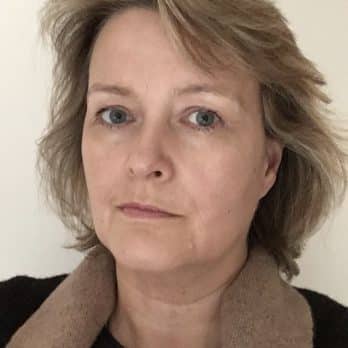
Debbie Keatley, patients’ representative
Debbie Keatley who has experienced cancer as a patient and carer, as well as other long-term conditions, is passionate about the rights of patients to be involved as equal partners in decisions that affect their treatment and care. Debbie’s ambition is for patients and the public across the UK to feel confident that they can access and understand the information in their health records and can make informed choices about how it’s used in their direct care and in research.
Debbie has worked in the private sector in international finance, in the voluntary sector in IT and training and development, in the public sector in further education and more recently as a policy adviser.
Debbie is now involved in an advisory capacity with many organisations and movements who rely on health data and recognise its importance in research to improve outcomes for patients. This includes useMYdata, Independent Cancer Patient Voice, Cancer Research UK’s Population and Clinical Research committees, National Cancer Research Institute’s Consumer Forum, and the Clinical Evaluations and Trials committee at National Institute for Health Research’s Health Technology Assessment programme.
Living in Belfast, Debbie is also a member of Northern Ireland Cancer Research Consumer Forum and the Council of Northern Ireland Cancer Registry. She is also involved in patient and public involvement in clinical studies from international to local level.
Role in MyPeBS
ICPV will work with patient representatives and advocacy groups to ensure that there is patient input into the development, implementation and dissemination of the work. ICPV will be especially active in work packages 5 & 6.
The MyPeBS study is supported by the French Health Insurance and the French National Cancer Institute (INCa), and has been approved by the Cancer Screening Strategic Committee chaired by the French General Director of Health.


